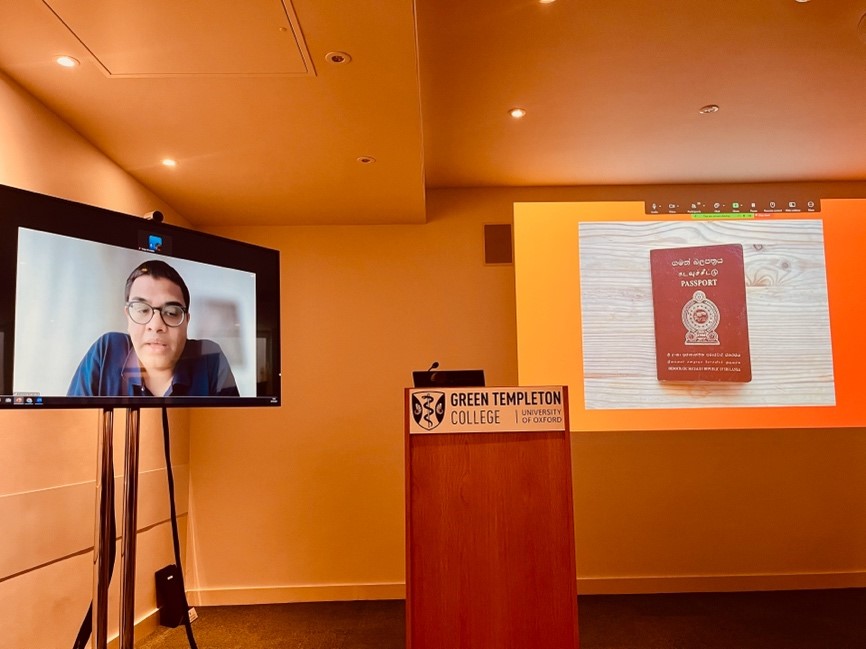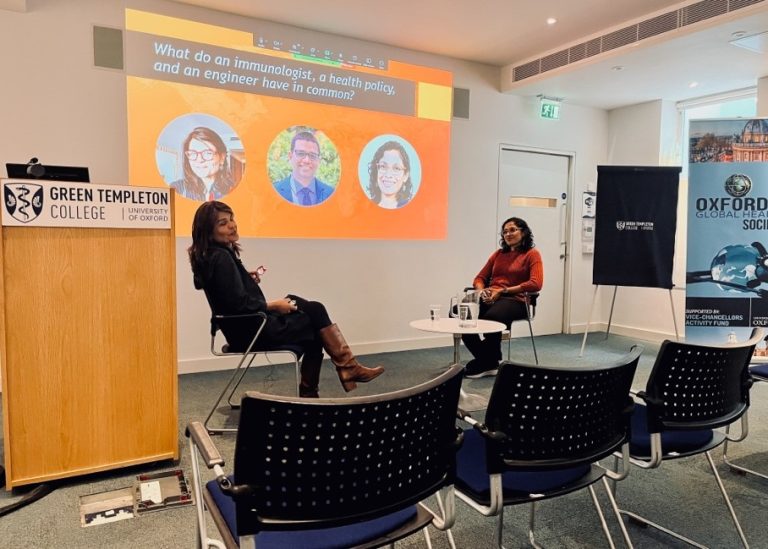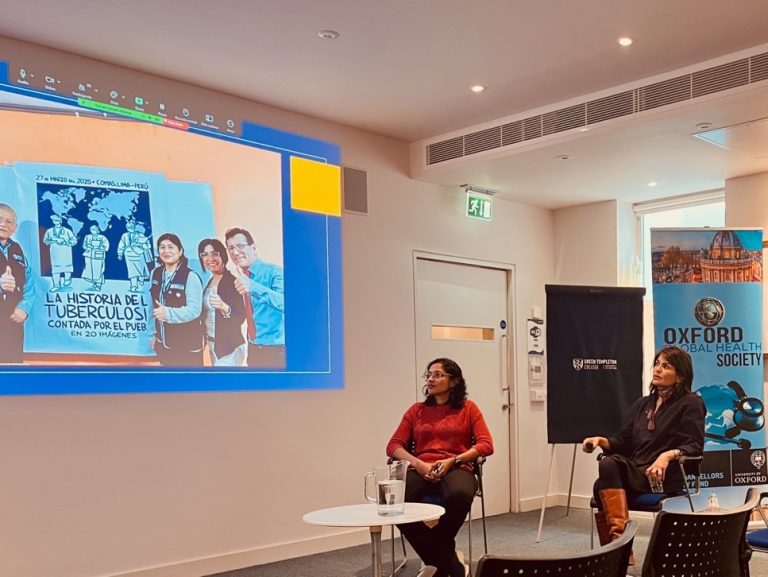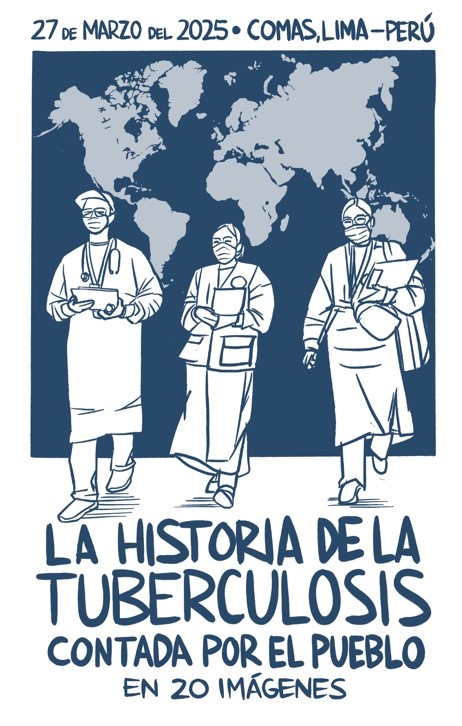Reimagining ‘A world where many worlds fit’ in global health

Last month, a panel of scholars from the Global South were convened by Professor Maju Brunette (MSc Global Healthcare Leadership, 2023) to discuss the difficult issues of power imbalances, structural injustice, and epistemic inequalities in global health research and practice. The panel, co-sponsored by Green Templeton College and the Nuffield Department of Primary Care Health Sciences, aimed to be a platform for the Green Templeton College academic community to adopt a ‘kaleidoscopic’ lens when examining the current decolonising global health narrative.
Maju and Dr Shashika Bandara (post-doctoral fellow at the Department of Global Public Health in the School of Population and Global Health at McGill University) reflect on the event and call for active engagement to challenge systemic structures that perpetuate inequalities in global health research and practice: Activate, Advocate, Agitate!
Building on the Nuffield Department of Primary Care Health Sciences 12-part ‘Decolonising Global Health’ blog series and on the momentum of a panel discussion held at Green Templeton last September, Beyond the Ivory Tower: Healthcare Leadership in Times of Crisis, the event, Beyond the Ivory Tower: A Dialogue on Decolonising Global Health offered an opportunity to imagine how individuals and institutions alike could adopt a decolonising mindset, and how would it look like. For those who could not attend, a recording of the event is available to watch here.
As panelists involved in this discussion – together with Professor Neelika Malavige – we wanted to share a brief perspective to foster conversation and inspire solution-building. The panel began by asking what brought together three individuals involved in global health in diverse settings and capacities: Neelika, an immunologist and an infectious disease researcher, Maju, an engineer by training and a health systems researcher focusing on health equity building, and Shashika, a post-doctoral fellow focusing on global health policy and governance. The common theme was that global health equity is central to our work: realizing sustainable solutions to global health challenges.

Maju Brunette asking the audience, “What do an immunologist, a health policy and an engineer have in common?
Three overarching themes emerged in our discussion. First, is the urgent necessity of allyship in global academia. As Neelika highlighted, the success of her research work in Sri Lanka was the product of the effective and sustainable partnership she built with her academic mentor. Ultimately, the bi-directional knowledge-sharing process, and subsequent partnerships, are highly valuable to Sri Lanka’s immunology research. This includes the laboratory capacity that helped diagnostic efforts during the COVID-19 pandemic. While this is one example, and perhaps an outlier, it could model better solution building through Global North-Global South allyship.
Second, is recognizing the fault-lines in our current system which result from the historical roots of global health. Shashika emphasised the importance of looking at the colonial roots of global health from malaria research to the emergence of tropical medicine and interconnected institutes. He highlighted that the widely recognized academic journal, the Lancet, has acknowledged its role in colonial medicine and the marginalization of non-western-centric knowledge. Furthermore, he outlined the challenges faced by a bi-directional knowledge-sharing process: visa and passport inequities, funding inequities in global health research and a lack of Global South representation in global health. If our allyship is to ring true, we need to first acknowledge, then introspect and commit to changing the unfair status quo by reforming how we teach, learn and practice global health.
Third, Maju raised the importance of bringing community voices to the decision-making table, in particular the voices of the marginalized and oppressed. In her work in Latin America, and among the US Latino working community, community involvement is essential not only to understand challenges, but also for sustainable solution building. She shared her story of working with communities impacted by tuberculosis and co-designing solutions, not just as an example of how academia in the Global North often misses the point (the ‘deficit model’, the ‘single story’), but to illustrate a much larger truth: Engaging communities in research is undeniably the essential and enabling factor to achieve the goal of having healthier and prosperous communities in Lima, Montreal, Colombo, and beyond. In her own words, ¡Si se puede!Overall, it is encouraging to witness the community at Oxford University engaging in global health equity conversations and committing to introspection. As we all know, in a fractured global health landscape, the commitments we make to principles of equity, to communities across the globe, and to genuine allyship, will be essential to address the global health crises we face from pandemics to climate crisis to armed conflicts.
We thank the Green Templeton College for their support in organizing, the community at Oxford University and those who joined online for your engagement. We remain open and committed to exploring equity building at Oxford and beyond.

Maju Brunette discussing a recent community-based participatory research (CBPR) initiative in Comas (Lima, Peru).

Cover for a graphic novel project that aims to reach the Latin American region and beyond.
Suggested reading
- Bandara S, Banerjee AT, Pai M (2025) Can we unplug global health education from The Matrix?
PLOS Global Public Health 5(2): e0004307. - Brunette, MJ (2021). Moving the needle on global health equity: a look back from 2030, Archives of Environmental & Occupational Health, 76:3, 121-122,
- Brunette, MJ (2025) ‘Rejecting the single story’. Decolonising Global Health Blog -a 12-part blog series, Nuffield Department of Primary Care Health Sciences Blog, Oxford University. 31 January.
- Malavige GN, Medigeshi GR, Sasmono RT, Amaratunga C. Funding and collaboration inequalities in infectious disease research – why does it matter? Trends Microbiol. 2025 Apr;33(4):378-381. Epub 2024 Dec 12. PMID: 39672746.
- Pai, Madhukar et al. (2024). Shifting power in global health will require leadership by the Global South and allyship by the Global North, The Lancet, Volume 404, Issue 10464, 1711 – 1713.
- Saha, Senjuti et al. (2024). Overcoming colonialism in pathogen genomics. The Lancet Digital Health, Volume 6, Issue 7, e520 – e525.

